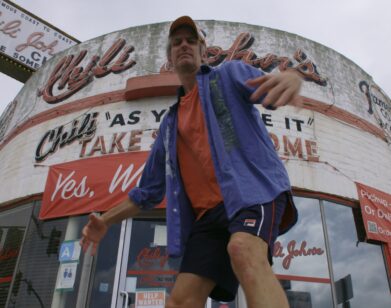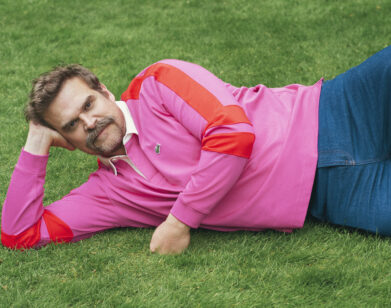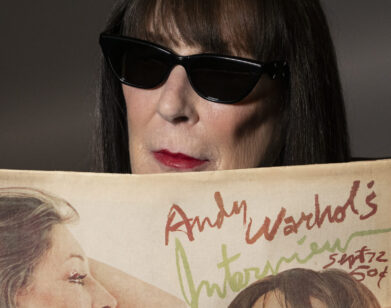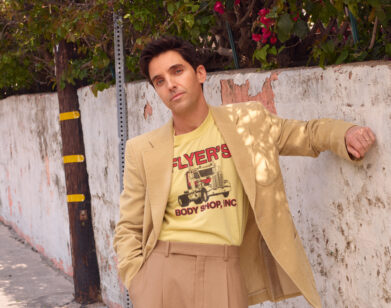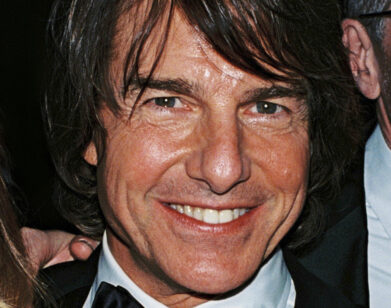Emily Browning’s East End Girl
EMILY BROWNING IN LOS ANGELES, OCTOBER 2015. PHOTOS: BRIAN HIGBEE. STYLING: ZOE COSTELLO/ART DEPARTMENT. MAKEUP: TRACEY LEVY/FORWARD ARTISTS USING SISLEY PARIS. HAIR: ALEX POLILLO/FORWARD ARISTS USING LEONOR GREYL. STYLING ASSISTANTS: SEBASTIAN HOHL AND KYLE SIMONE.
In the 1960s, twin brothers Ronnie and Reggie Kray were infamous. The seedy side of Swinging London, they ruled over London’s East End with their gang The Firm and older brother Charlie. They dealt in threats, intimidation, and extortion; they relished in blurring the line between glitz and gangland. Celebrities frequented their nightclub Esmeralda’s Barn, Ronnie had a fling with conservative MP Lord Robert Boothby, and David Bailey captured their portrait. Then they spent three decades incarcerated. Ronnie died in a psychiatric hospital of a heart attack; Reggie was released from prison eight weeks before his death from cancer.
In Brian Helgeland’s biopic Legend, the peak and fall of the Krays—both of whom are played by the brilliant Tom Hardy with the help of his Mad Max stunt double—is filtered through the story Reggie’s first wife Frances Shea, played by Australian actor Emily Browning. You could call it a tragedy. Frances was just 16 when she met Reggie, who was immediately taken with her. She had already suffered an unnamed psychological ordeal, and believed that her love could redeem her older boyfriend. But Reggie was always a package deal and their seven-year relationship was a constant battle for attention between Frances’ and Ron.
For Browning, though, Frances was more than just a victim. Before filming, to make up for the derth of information on Frances in popular history, Helgeland purchased two of her letters to Reggie for Browning to read: “One at the beginning of their relationship—sort of a sweet love letter—and one she’d written towards the end, which was not sweet.”
“It was really nice for me to see those two sides,” Browning explains. “That’s what I loved about the character—she was genuinely in love with this man and she was this fragile, sweet girl with a lot of her own issues, but she was also ballsy enough to stand up to someone that not many people would have stood up to.”
Now 26, Browning began her career as a child actor in her native Australia. She started in television before taking roles in independent films such as The Man Who Sued God (2001) with Billy Connolly, Ghost Ship with Gabriel Byrne (2002), and Ned Kelly with Heath Ledger, Geoffrey Rush, Naomi Watts, and Orlando Bloom (2003). After making her Hollywood debut in Lemony Snicket’s A Series of Unfortunate Events she returned to Australia to finish school.
EMMA BROWN: Frances was so young when Reggie started pursuing her. She was never allowed to develop on her own.
BROWNING: At least our version of Frances—I can’t speak for Frances the real person, but the way Brian and I went about portraying her was that even though she was very young, she’d really been through a lot by that point in her life. I don’t know if it was ever confirmed, but there were stories about the fact that she had been sent away when she was quite young because of being “fragile,” which is the euphemism that they used. She had a lot of struggles on her own before she met Reggie. Our version of the character was quite mature for her age. I agree with you that she didn’t have a chance to become her own, full human being before marrying this guy, but then again, at that time so many people paired off and married so young, that idea of being single and figuring yourself out before you get to someone is sort of a modern concept.
BROWN: Ron seems to see right through Frances in a way that’s kind of eerie. There’s that moment when he tells her she’s a ghost and she’s so taken aback by it.
BROWNING: We spoke about that a lot in the rehearsal period—the fact that Ron and Frances actually have this unspoken connection that Reggie and Frances don’t have. Ron and Frances have a lot more in common than Reggie and Frances do. I was talking to Brian about the fact that in relationships, or at least the relationships I’ve been in, there’s usually one person that’s on the ground and there’s one person who’s floating around in space a little bit, and I’m generally the person whose floating around in space. I feel like those couples often work well together because the person that’s floating around has something to hold onto and the person on the ground has something to draw their attention out at something else and something different. It’s about people operating on different wavelengths and finding their connection in the middle of that. I think it’s kind of a nice balance to have in a relationship. Ron and Frances are both people that are floating around in a different world that Reggie can’t really see or understand. Again, this is all our version of the characters.
BROWN: It’s sad because you can see a world in which they are friends.
BROWNING: I think my favorite scene in the film to watch is the moment where Frances leaves Reggie, and Ron walks up to the car and says, “I always liked you,” which I think for Frances in that scene is a little difficult to believe, but you see in that moment, these two actually get each other. They understand each other. When she kisses him on the cheek, it’s just my favorite thing to watch. It’s really sad, if they weren’t in this horribly messed up situation where both of them required Reggie’s full attention and were kind of fighting over him, they could have gotten along really well.
BROWN: In terms of the mechanics of Tom playing both Ron and Reggie, would you do every scene with both brothers in it twice?
BROWNING: We would do a lot more than two takes, but we would shoot with Tom as Reggie usually in the morning and then he would change into his Ron costume and his Ron hair and makeup and we would shoot it again from the top.
BROWN: Did you know which takes they used, whether you were acting with Tom as Reggie and his stunt double Jacob as Ron or vice-versa?
BROWNING: I’m sure there are a few moments in the film where it was close-ups of me acting off of Jacob. I think that’s just a testament to the incredible job he did at occupying whatever role Tom wasn’t in. He really had the body language down. He generally didn’t say the lines—they fed to us through an ear piece, so it was always Tom saying the lines—but having Jacob there moving the way Tom did as a character was really useful. The fact that he could actually act was very helpful. That was one of my concerns that I brought up to Brian, “In the scenes with both brothers, who will be playing the other brother?” And Brian said, “Tom’s stunt double,” and I was like, “Oh, a stunt double…I don’t know how I feel about that.” Then I met Jacob and we all rehearsed together and he was great; he was really present and really good at stepping in wherever Tom stepped out. It was strange to watch the movie for the first time because it was like, “Oh, Jacob’s not in the movie.” He was such a strong presence on the set day after day, to watch it and realize, “Oh yeah, he’s not actually in the film” was strange.
BROWN: We did a piece on Paul Anderson and he was hilarious.
BROWNING: He is one of the most hilarious people I know.
BROWN: It seems like being on set with him and Tom would just be so much fun.
BROWNING: It was very fun. This is one of my favorite shoots that I’ve ever done and the days where I was working with Tom, Jacob, and Paul, it didn’t even feel like work to be honest with you. I’ve actually known Paul for a while. I knew him already when I started filming. So that was really nice having someone there that would kind of cheer me up if I was having a rough day, which I never ended up really having—it was such a dreamy, perfect shoot. But he’s amazing and so quick and ridiculous and funny. Him and Tom together…it’s insane, they should have a reality show.
BROWN: How did you know Paul?
BROWNING: I used to live in London and I think we first met at a coffee shop. We were sitting at Flat White and we just struck up a conversation. Then months later I went out to dinner with a friend of mine and his friends were going to be there and one of his friends was Paul. We never worked together before, but we had mutual friends and saw each other around in London quite a lot.
BROWN: I know Tom and Paul have worked together several times and are good friends in real life. If you could recommend a friend for your next project, who would you want to work with?
BROWNING: I’m not entirely sure what the next project is yet—well I am, but I’m not sure if it’s at a stage where I’m allowed to talk about it yet. It depends on what the film is, but there are so many actors that I’ve worked with that I’d like to work with again and there are so many girls. So often when you’re up for a role, you’re the only girl, and people think that a positive thing: “You get to be the only girl here!” That’s not an exciting kind of idea to me; I want to work with more girls. It’s nice. I had a great time on Legend, but I sort of wished there was another girl around. I’m really close friends with Hannah Murray who I did God Help the Girl with and I would love to work with her again. And Jenna Malone. Just a bunch of girls that I’m friends that also happen to be incredibly talented actors. It would be cool to get a little girl gang together and make a film—maybe where there’s only one boy, instead of one girl, which is how it goes most of the time.
BROWN: You moved to L.A. for a bit when you were 14, but you didn’t really enjoy it?
BROWNING: It’s not that I didn’t enjoy it, it didn’t feel like the right place for me to be at the time. I moved here [to L.A.] to work on Lemony Snicket. I was here for nine months and I took that time off school. When I first came here, I was thinking, “Maybe I’ll leave school and just work with a tutor. I’ll finish high school through correspondence and stay in L.A. and keep working,” and then it became apparent very quickly that I really was missing that high school experience. I wanted to be back in Australia with my friends and go to classes and feel like a normal teenager. I’m really glad that after I made that film, I decided to stop acting for a few years so that I could graduate high school. I’m so glad that I had the foresight to do that at the time, because I saw a lot of people in Los Angeles whose lives were the film industry—they were brought up in the film industry—and they didn’t really have a proper understanding of how the world worked outside of the film industry. I realized very quickly that’s not what I wanted. My job is to portray real human beings and real human experiences, and if I haven’t had a real human experience myself outside of the film industry, how am I going to be able to do that? So it wasn’t that I disliked L.A., it just didn’t feel like the place for me. To be honest, it didn’t feel like the place for me for a long, long time. It was only about two years ago that I found the neighborhood that I liked and found a group of friends and decided to give it a go and live here. I’ve been here about two years now and I doubt it’s going to be permanent, but right now I really enjoy the city.
BROWN: Was it easy to go back to school after having being away for nine months? Did you feel like you missed out?
BROWNING: Actually, I felt much better and more comfortable in high school after coming back. In seventh and eighth grade I was very concerned with trying to be popular and be liked and be this version of myself that I thought I should be. I think going away for that amount of time I realized the world is huge. I can’t really explain what it was, but I got back with this sense of, “It doesn’t really matter what people think of me, I should just be connecting with people I really like instead of pretending to be this perfect version of myself.” I felt much better after I came back and that’s when I met my best friend, who I’m still best friends with now, and when I started to become myself a bit more and to spend time with people who I genuinely liked as opposed to the people I felt I should be spending time with.
BROWN: You had done movies in Australia before Lemony Snicket—was it just a very different experience in Australia versus L.A.?
BROWNING: Yes, it was. It was a much bigger crew, much bigger budget certainly, and I noticed more separation between the cast and the crew. I feel like in Australia, all the films I’ve done, we’re all equal moving parts in this equation of making the film—an actor is another crew member, essentially. I liked that. That’s what I was used to. Then moving onto this huge budget film, we’d shoot and then the actors would go and sit in their trailers and they didn’t socialize so much with the crew. That was odd to me; it didn’t really make sense to me. That’s definitely not all productions, but I suppose that’s the way it works on big films. It was a relief to me to start making independent movies here and to realize that it’s much more similar to the Australian film industry than I thought it was. I definitely noticed the difference in those ways, but also a lot of exciting ways. I was 14 years old and there was a massive tent with every possible snack I could ever want, every soft drink, every flavor of crisps. We had trailers with TVs and Nintendos in them. It was kind of a dream for a kid. But it was strange.
BROWN: No such luxuries on the set of Ned Kelly?
BROWNING: [laughs] No. They had the tea trolley, like tea and biscuits, but not quite the same.
LEGEND OPENS TOMORROW, NOVEMBER 20.


